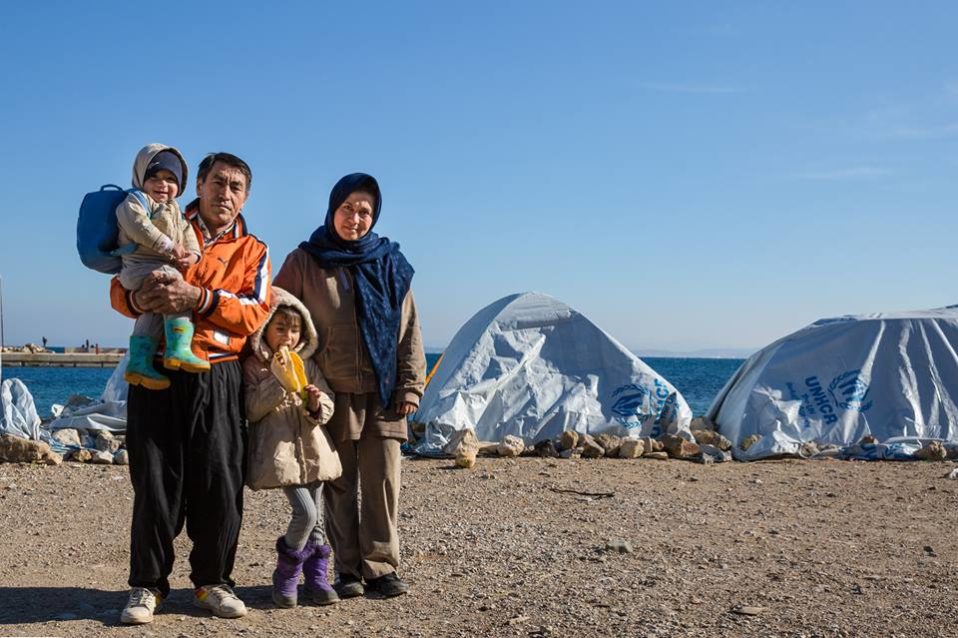Follow our Advent Calendar, where we will introduce 24 stories from people in the refugee camps where we work and from people we have met over the years in Greece. Every day we present a new story and let you have an insight into who the people on the run are.
3. December: Zafar and Raihana
Written by Jamie Janson, photographed by Nickie Mariager-Lam and translated by Khesrow Cash Shams
Zafar and Raihana are one of the kindest looking couples you see around Souda Camp. And caring for their two little children give their days here some sense of purpose, unlike the mostly single young men who pace, sleep and wait.
The Drop in the Ocean volunteers have just finished a large distribution of children’s bags full of toys, and five year old Selena is happily wearing her new little blue backpack. Mahadi, less than a year old, is shielded from the elements, that Souda’s windswept little promontory is so exposed to, by Raihana’s arms, although this causes her constant pain.
They say they had a good life growing up in Afghanistan in the 1980’s, managing cattle and growing rice, even though the country was “full of hate”. The carnage of the Russian invasion mostly passed their mountain farm by. Their trouble really started when the Taliban came to power and started persecuting Shia communities like theirs. They were often unable to leave the house, because of the danger and say many of their friends and relatives were beheaded. Raihana had pains in her legs from farm work and suffered a broken arm during this time, but was unable to seek medical help.
As so often during these interviews, the language and experience gaps between us make it hard to visualise how they coped during these times: How do you go shopping? How do you sleep at night? How many of your neighbours get hacked to death before you decide to leave? Finally, running out of money, they fled to Iran, a three-day journey where they ended up wading across a freezing river upto their necks while holding their children over their heads. The people smugglers carried big sticks to beat anyone moving too slowly. There was no way for them to earn any money in Iran so they continued to Turkey, and fortunately their first attempt to get to Chios, in a 12 person boat crammed with 25, was successful.
Raihana suffered excruciating pain throughout the journey, but any hope of proper medical care in Europe was premature: At Souda a couple of medical charities provide doctors, who work out of their cars in the nearby parking lot, but she has only been given a few painkillers and the freezing conditions at night are only making her pains worse.
The constellation of EU and UN bodies overseeing the refugee archipelago promised to ‘winterize’ camps like Souda, but there is no evidence of that taking place. Perhaps the self-congratulatory tone of their progress announcements would be more subdued if they came and sat with this family for a bit, in their flimsy unheated tent. They have been unable to wash properly in the 40 days they have been in the camp, due to the lack of hot water. They are afraid their children will get sick if they expose them too much to the cold. The children can’t sleep properly because of the noise in the camp at night. Many vulnerable families have finally been moved to Chios hotels by now, but this one has been told repeatedly there are no more rooms available, or perhaps many of the empty hotels on the island don’t want refugees staying.
With a sudden flutter of inner cultural prejudices I notice Raihana, fully covered and wearing a blue headscarf, has started breastfeeding Mahadi. I fasten my eyes on my notepad. A few days earlier I took a day-off to visit Chios as an off-season tourist. The drive through a picturesque, almost empty island, only underlined the cruel absurdity of cramming all the people on the island most in need of Europe’s help into the ugly, abandoned aluminium factory of Vial and the medieval ditch of Souda. The Chios Council recently offered the use of a third site, but volunteers turned up to discover it was a stinking ex-rubbish dump.
I fantasise that the EU billions frittered away on its shoddy refugee archipelago, maintained by an army of securicrats, could have easily paid for a nice new 4 star resort for a few thousand refugees in one of Chios’ many empty coves. With money left over to hire us all as white-suited waiters taking orders by the pool.
Mahadi has fallen asleep. As so many other parents here have told us, Zafar and Raihana say they don’t care about themselves, they just want to get to a place where their children can have security and a normal upbringing. Their only moment of amused disagreement comes when Zafar says he wants them both to be doctors, but Raihana just wants them to do whatever makes them happy.
They feel that the Afghan people have been forgotten by Europe and everything in their experiences of Europe so far is reinforcing that belief. Let’s hope the wealthiest continent on Earth can find them a warm room before snow arrives on Chios.



Post a comment